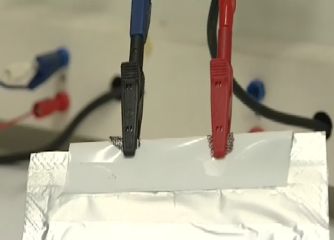Home > Press > Progress in the development of rechargeable batteries through nanotechnology
 |
Abstract:
Researchers are testing different ways of improving rechargeable batteries for electric vehicles and nanotechnology plays an important role in the development. The aim is to offer batteries that have fast charge and discharge rates as well as high stored energy per mass. This can make electric vehicles a competitive alternative to petrol-powered vehicles.
Progress in the development of rechargeable batteries through nanotechnology
Italy | Posted on May 31st, 2011A significant challenge for researchers in the field of rechargeable batteries is to construct batteries which can be charged and discharged quickly with only minimal energy capacity loss. In Nature Nanotechnology, researchers at University of Illinois at Urbana-Champaign in the U.S. have recently published an approach that significantly reduces the energy capacity loss, when very fast charge and discharge rates are offered. Only two minutes are needed to charge a lithium-ion battery to 90 percent. This approach involves cathodes created from a 3-D nanostructure.
Another candidate for revolutionizing the field of rechargeable batteries in the future is the lithium-air battery, with a cathode made of a material that can make use of the surrounding air‚s oxygen and a lithium anode. Lithium oxide or lithium peroxide is formed and energy is released, when oxygen is combined with the lithium. The battery has a high energy density comparable to petrol. This could substantially improve the distance electric vehicles can travel before recharging is needed, but compared to a lithium-ion battery, this battery can only be recharged a fraction of the times.
Researchers connected to the European Commission-funded project ALISTORE are using nanoparticles, which improve the electrical conductivity, for the development of very powerful batteries suitable for electric vehicles. The speed of the ions moving from one electrode to the other will increase. Through this approach based on nanomaterials it is possible to use the energy faster.
However, it will take years before this innovation is used in electric vehicles. The researchers need to make sure that that the vehicles can travel with the same speed as vehicles using petrol and that the batteries don‚t need to be recharged too often. It will only take a few minutes to fully charge these batteries, which is important in order to be competitive, and they can last 160 km in Renault's Zero Emission concept car.
The researchers are far from offering batteries that can sustain as long drives as petrol. However, the progress made is an important step towards reducing the environmental impact of vehicles.
####
For more information, please click here
Contacts:
Elisabeth Schmid
Phone: +390270002572
Fax: +390270002540
Copyright © youris.com
If you have a comment, please Contact us.Issuers of news releases, not 7th Wave, Inc. or Nanotechnology Now, are solely responsible for the accuracy of the content.
| Related News Press |
News and information
![]() Researchers develop molecular qubits that communicate at telecom frequencies October 3rd, 2025
Researchers develop molecular qubits that communicate at telecom frequencies October 3rd, 2025
![]() Next-generation quantum communication October 3rd, 2025
Next-generation quantum communication October 3rd, 2025
![]() "Nanoreactor" cage uses visible light for catalytic and ultra-selective cross-cycloadditions October 3rd, 2025
"Nanoreactor" cage uses visible light for catalytic and ultra-selective cross-cycloadditions October 3rd, 2025
Announcements
![]() Rice membrane extracts lithium from brines with greater speed, less waste October 3rd, 2025
Rice membrane extracts lithium from brines with greater speed, less waste October 3rd, 2025
![]() Researchers develop molecular qubits that communicate at telecom frequencies October 3rd, 2025
Researchers develop molecular qubits that communicate at telecom frequencies October 3rd, 2025
![]() Next-generation quantum communication October 3rd, 2025
Next-generation quantum communication October 3rd, 2025
![]() "Nanoreactor" cage uses visible light for catalytic and ultra-selective cross-cycloadditions October 3rd, 2025
"Nanoreactor" cage uses visible light for catalytic and ultra-selective cross-cycloadditions October 3rd, 2025
Automotive/Transportation
![]() Sensors innovations for smart lithium-based batteries: advancements, opportunities, and potential challenges August 8th, 2025
Sensors innovations for smart lithium-based batteries: advancements, opportunities, and potential challenges August 8th, 2025
![]() Simple algorithm paired with standard imaging tool could predict failure in lithium metal batteries August 8th, 2025
Simple algorithm paired with standard imaging tool could predict failure in lithium metal batteries August 8th, 2025
Battery Technology/Capacitors/Generators/Piezoelectrics/Thermoelectrics/Energy storage
![]() Rice membrane extracts lithium from brines with greater speed, less waste October 3rd, 2025
Rice membrane extracts lithium from brines with greater speed, less waste October 3rd, 2025
![]() Sensors innovations for smart lithium-based batteries: advancements, opportunities, and potential challenges August 8th, 2025
Sensors innovations for smart lithium-based batteries: advancements, opportunities, and potential challenges August 8th, 2025
![]() Deciphering local microstrain-induced optimization of asymmetric Fe single atomic sites for efficient oxygen reduction August 8th, 2025
Deciphering local microstrain-induced optimization of asymmetric Fe single atomic sites for efficient oxygen reduction August 8th, 2025
|
|
||
|
|
||
| The latest news from around the world, FREE | ||
|
|
||
|
|
||
| Premium Products | ||
|
|
||
|
Only the news you want to read!
Learn More |
||
|
|
||
|
Full-service, expert consulting
Learn More |
||
|
|
||








